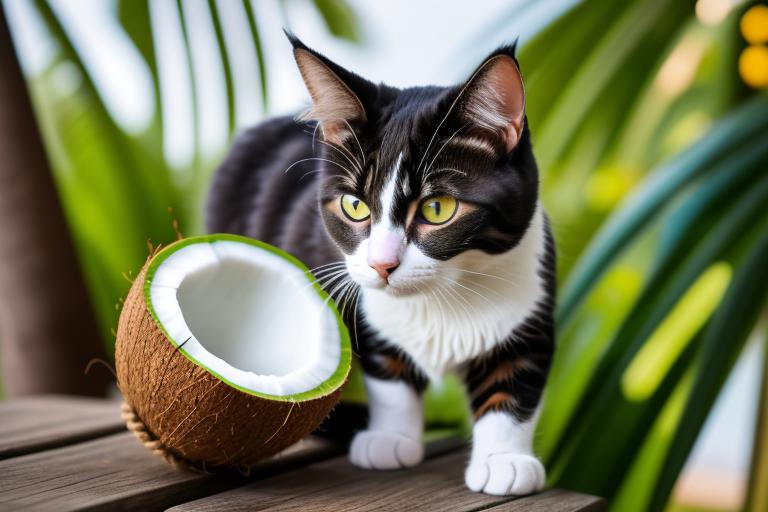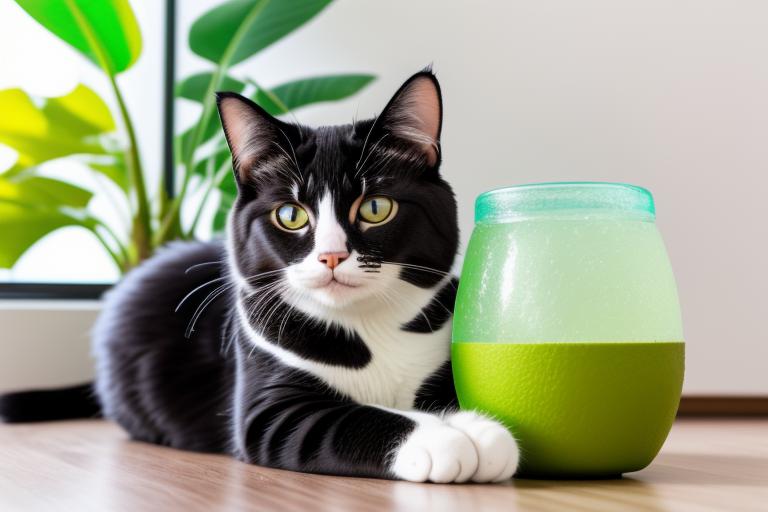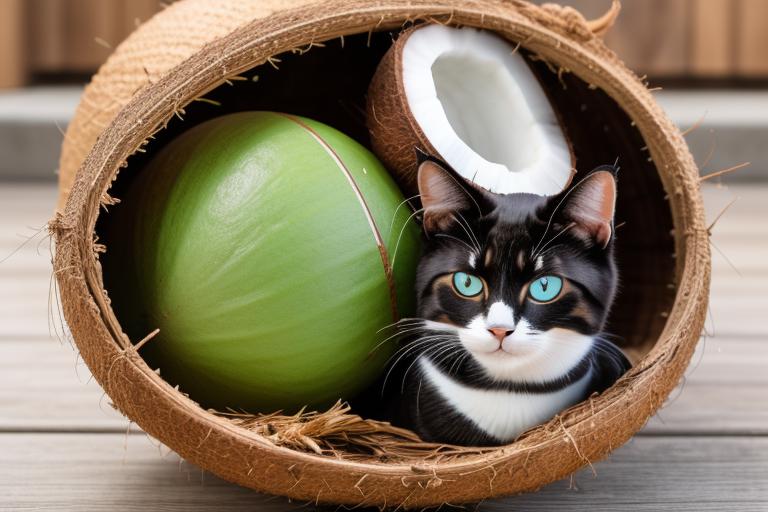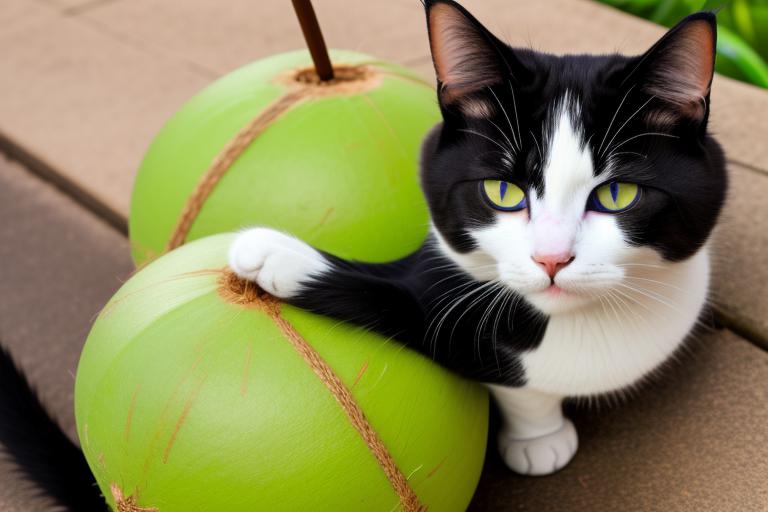Have you ever wondered if cats can enjoy a refreshing sip of coconut water? While cats are known for their discerning taste and selective palate, the idea of them indulging in this tropical beverage may seem intriguing.
But before you rush to offer your feline friend a taste, there are a few important considerations to keep in mind. Understanding the potential benefits, nutritional value, and possible risks of coconut water for cats is essential to ensure their well-being.
So, let’s explore whether coconut water is a suitable choice for our beloved whiskered companions.
Health Benefits of Coconut Water for Cats
Coconut water can provide several health benefits for your cat. One of the main benefits is that it serves as a great hydration option. Cats need to stay well-hydrated to maintain good health, and coconut water can help with that. It’s a natural source of electrolytes, which are essential for maintaining proper fluid balance in the body. Electrolytes like potassium and magnesium can help prevent dehydration in cats, especially during hot summer months or when they’re recovering from an illness.
Additionally, coconut water is low in calories and fat, making it a healthier choice compared to other beverages. It can be a good alternative to sugary drinks and can help in weight management for overweight cats. Coconut water also contains antioxidants, which can help boost your cat’s immune system and protect against free radicals.
However, it’s important to note that coconut water should be given in moderation. Too much can lead to an upset stomach or diarrhea in cats. Always consult with your veterinarian before introducing any new food or drink into your cat’s diet.
Nutritional Value of Coconut Water for Cats

To understand the nutritional value of coconut water for cats, it’s important to consider its composition and the benefits it can provide.
Coconut water is rich in essential nutrients that can be beneficial for both kittens and senior cats. Coconut water is a natural source of hydration and contains electrolytes such as potassium, calcium, and magnesium, which are essential for maintaining proper bodily functions. These minerals help regulate nerve and muscle function, maintain a healthy heart rhythm, and support bone health. For kittens who are growing rapidly, these minerals are particularly important for their development.
Additionally, coconut water is low in calories and fat, making it a suitable choice for senior cats who may be prone to weight gain or have digestive issues. It’s also a good source of antioxidants, which can help boost the immune system and protect against cellular damage.
However, it’s important to note that coconut water shouldn’t replace regular water in a cat’s diet. While it can be a refreshing and nutritious treat, it should be given in moderation and as part of a balanced diet. Always consult with your veterinarian before introducing any new food or beverage to your cat’s diet, especially if they have any underlying health conditions.
Potential Risks of Giving Coconut Water to Cats
Before giving coconut water to your cat, it’s important to be aware of the potential risks involved. While coconut water is generally safe for cats in small amounts, there are a few potential risks to consider.
One of the main concerns is cat allergies. Just like humans, cats can develop allergies to certain foods, including coconut. If your cat has never had coconut before, it’s best to introduce it slowly and monitor for any signs of an allergic reaction. Symptoms of an allergic reaction may include itching, hives, vomiting, or diarrhea. If you notice any of these symptoms, it’s important to stop giving coconut water to your cat and consult with your veterinarian.
Additionally, coconut water can potentially cause digestive issues in cats. Some cats may experience an upset stomach or diarrhea when consuming coconut water. This could be due to the high sugar content or the natural laxative properties of coconut water. If you notice any digestive issues after giving coconut water to your cat, it’s best to discontinue its use and consult with your veterinarian for further guidance.
Can Cats Drink Coconut Water to Stay Hydrated?

If you’re wondering whether cats can stay hydrated by drinking coconut water, there are a few factors to consider. Coconut water can be a good source of hydration for cats due to its high water content. It contains electrolytes such as potassium, magnesium, and calcium, which can help replenish fluids and maintain proper hydration levels in cats.
One of the benefits of hydrating cats with coconut water is that it can be a natural alternative to regular water. Some cats may be picky about drinking plain water, but the slightly sweet taste of coconut water may entice them to drink more. Additionally, coconut water is low in calories and fat, making it a healthier option for hydrating cats compared to sugary drinks or milk.
However, it’s important to note that coconut water shouldn’t replace a cat’s main source of hydration, which is fresh water. While coconut water can be offered as an occasional treat or supplement, it shouldn’t be the sole source of hydration for cats. Also, it’s crucial to check the ingredient list and ensure that the coconut water doesn’t contain any added sugars or artificial sweeteners, as these can be harmful to cats.
How Much Coconut Water Can Cats Safely Consume?
When it comes to the amount of coconut water that’s safe for cats to consume, there are a few guidelines to keep in mind.
It’s essential to remember that coconut water should only be given to cats in moderation. While coconut water can be a refreshing and hydrating treat, it shouldn’t replace your cat’s regular water intake. Giving your cat too much coconut water can lead to digestive issues, such as diarrhea.
As a general rule, it’s recommended to give your cat no more than a tablespoon of coconut water per day. It’s also important to choose a high-quality coconut water brand that doesn’t contain any additives or preservatives.
Additionally, coconut water isn’t suitable for kittens, as their digestive systems are more sensitive. It’s always best to consult with your veterinarian before introducing coconut water or any new food or drink into your cat’s diet.
Precautions to Consider Before Giving Coconut Water to Cats

Before introducing coconut water to your feline friend, it’s important to consider a few precautions.
- Consult with your veterinarian: Before giving coconut water to your cat, it’s crucial to consult with your veterinarian. They can provide guidance based on your cat’s specific needs and health conditions. It’s important to remember that every cat is unique, and what works for one may not work for another.
- Monitor for allergic reactions: While coconut water is generally safe for cats, some cats may be allergic to it. Before giving your cat coconut water, monitor them closely for any signs of an allergic reaction such as itching, swelling, or digestive issues. If you notice any adverse reactions, stop giving coconut water immediately and consult your vet.
- Consider the sugar content: Coconut water contains natural sugars, which can be harmful to cats if consumed in excess. It’s important to limit the amount of coconut water you give your cat and ensure it isn’t sweetened or flavored, as artificial sweeteners like xylitol can be toxic to cats.
Alternative Hydration Options for Cats
Consider incorporating other hydrating options for your cat. While coconut water may not be suitable for cats, there are alternative beverages that can help keep your feline friend hydrated. One excellent option is plain water. Water is essential for your cat’s overall health and can help prevent dehydration. Ensure that fresh, clean water is always available for your cat to drink.
Another alternative is specially formulated cat-friendly beverages. These beverages are designed to provide hydration and can be found in pet stores or online. They’re specifically made with ingredients that are safe for cats and can help replenish their fluid levels.
Furthermore, you can try offering your cat bone broth or low-sodium chicken or beef broth. These broths not only provide hydration but also offer additional nutrients. Just make sure to check the labels and avoid any broths that contain onion or garlic, as these can be harmful to cats.
Lastly, consider wet cat food as a source of hydration. Wet cat food contains a higher moisture content compared to dry kibble, which can help keep your cat hydrated. However, it’s important to consult with your veterinarian to ensure that your cat’s dietary needs are met.
Frequently Asked Questions
Coconut water can be a beneficial option for feline hydration, particularly for cats with kidney problems. It provides electrolytes and can help maintain hydration levels, but consult with your vet to ensure it’s safe for your cat’s specific condition.
Coconut water can be beneficial for hydration in cats and may have potential benefits for urinary tract infections. However, it’s important to consult with a veterinarian before giving coconut water to your cat.
Coconut water can be a beneficial source of hydration for kittens. However, it’s important to note that there are alternative options available, such as plain water or specialized kitten milk, that may be more suitable for their specific needs.
Coconut water can provide benefits for cats, including potentially helping with hairball problems. However, it’s important to consult with your vet before giving coconut water to your cat to ensure it’s safe for them.
Coconut water for cats can be a refreshing alternative to regular water. It contains essential nutrients and can provide hydration. However, it should not substitute regular water entirely, as cats primarily need water for proper hydration.
Conclusion
In conclusion, while coconut water may offer some health benefits and nutrients for cats, it’s important to exercise caution and consult with a veterinarian before giving it to them.
There are potential risks and precautions to consider, such as the sugar content and possible allergic reactions.
It’s always best to provide cats with alternative hydration options recommended by a professional to ensure their well-being.

